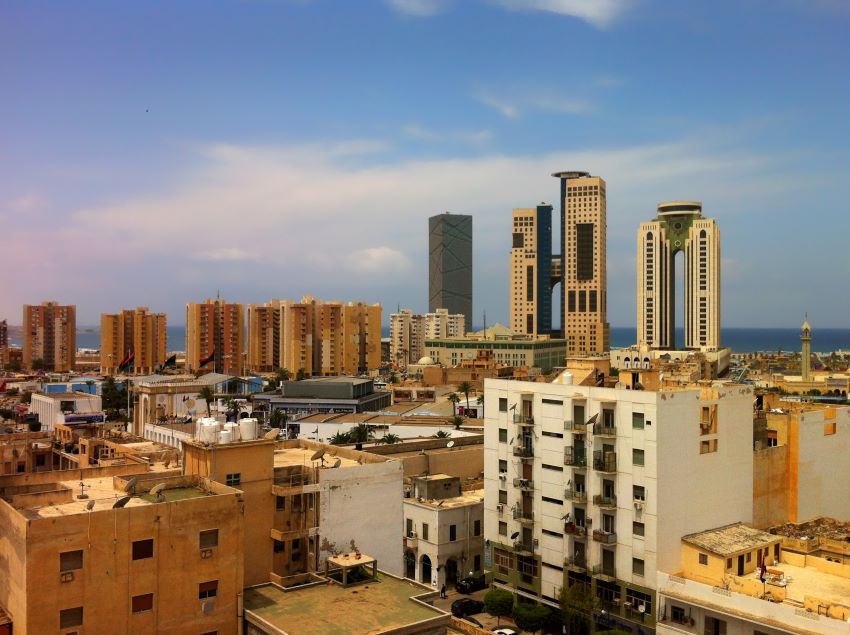Moving To Libya From US

Get a Free Moving Quote Now!
Start Your International Moving Journey





Well-known for its oil reserves, Libya is a North African nation. The country has a population of approximately 6.8 million people and its official language is Arabic. Libya has a diverse mix of cultures and religions, with the majority of the population being Sunni Muslim.
The country has a rich history, with influences from ancient civilizations such as the Phoenicians, Greeks, and Romans. Libya is also home to numerous oil reserves, which has made it an important player in the global oil market. However, in recent years, Libya has been undergoing political and economic instability, which has affected its economy and infrastructure.
So, when you plan to move to Libya from the USA take note of the current global situation and plan accordingly.

The International Sea & Air Shipping Advantages
Making an international relocation is all about planning properly. When you are planning to move to Libya from the USA it is a move between two different continents and therefore, there will be considerable changes in all aspects of life. In any international relocation, you will have to consider important steps and responsibilities like obtaining the necessary documents and residency permits etc.
Moving to Libya from the USA doesn’t have to be challenging. To ensure you can look forward to a hassle-free move, it will be helpful to hire an international mover. At International Sea & Air Shipping we have extensive experience in international relocation and can offer you high-quality moving services so that you can look forward to a smooth transition.
Here is what you can avail with us at International Sea & Air Shipping. We offer a team of experienced movers, and a wide range of moving services including, packing and shipping your household goods and other belongings. Additionally, at International Sea & Air Shipping you can avail of many other bespoke relocation services to match your exact requirements for moving to Libya from the USA.
About Libya
Libya originally derives from the Libu tribesmen. Libya was one of the wealthiest countries in the world and its GDP per capita was higher than that of developed countries such as Italy, Singapore, South Korea, Spain and New Zealand.
Libya government is divided into Great Socialist People’s Libyan Arab Jamahiriya controls west part and Libyan Republic controls east of the country. Libya is member of international organizations like G-77, OAPEC, OPEC, WHO, WTO (observer) and more.
Libya is the 4th largest country in Africa by area, and the 17th largest in the world in size. The bordering countries of Libya are Algeria, Chad, Egypt, Niger, Sudan and Tunisia. Libya has the highest Human Development Index in Africa.
Libya has the 4th highest GDP per capita in Africa as of 2009, behind Seychelles, Equatorial Guinea and Gabon. Libya has the 10th largest proven oil reserves of any country in the world and the 17th highest petroleum production. Libya’s trade partners are Italy, Germany, France, Spain, Switzerland, USA, China, Turkey, Tunisia and South Korea.
International relocation to Libya from the USA – important information
As an expat from the USA moving and staying in Libya always needs to be in line with the international regulations. Due to the frequent socio-political clashes, the country experiences instability in various aspects of life.
The job market may be uncertain and the quality of living is not of high standard. However, if you need to move to Libya and you have the necessary permissions to do so, this guide will help you navigate the different challenges of an international relocation.
The embassy website can provide useful information and assistance, including ROI forms for obtaining a visa. Moving to a new country can be an exciting adventure, but it’s important to prepare yourself for the challenges that come with it.
Visa & residency permits for moving to Libya from the USA
Visa for Libya is not available for US citizens as US nationals cannot permanently move or settle in Libya at present due to various security concerns and travel advisories. Prospective settlers need to check with the Libyan embassy in Washington, D.C. to understand the latest immigration policies that govern such moves.
General visa information
There are several types of visas available, including tourist visas, business visas, and student visas. You will need to provide proof of your identity, purpose of visit, and financial means to support yourself in Libya. You may also need to undergo medical examinations and background checks. It is recommended to apply for a Libyan visa from the Libyan embassy or consulate in your home country.
Cost of living in Libya
The cost of living in Libya varies depending on the city, the standard of living, and the country’s current economic situation. The cost of housing, food, transportation, and utilities can vary significantly from city to city.
Some cities in Libya have a lower cost of living compared to others, such as Benghazi, Al Bayda, and Ajdabiya, which offer more affordable housing and transportation. However, Tripoli and Misurata have a higher cost of living due to their popularity as tourist destinations and a higher demand for services.
Top places to live in Libya
There are quite a few good places to live in Libya. Take a look at the following list –
Tripoli
The capital of Libya is a cultural hub with a mix of modern and traditional lifestyles.
Benghazi
The second largest city in Libya, Benghazi is known for its vibrant nightlife.
Tobruk
Located on the Mediterranean Coast, Tobruk has a rich history and stunning beaches.
Ras Lanuf
A coastal city in eastern Libya with beautiful sandy beaches.
Misurata
A coastal city in central Libya with a laid-back atmosphere.
These cities offer a mix of modern amenities, cultural experiences, and natural attractions.
Climate in Libya
When you move to a new country and that too, in a different continent altogether, it is best to be aware of the climate you are going to face. This will help you to be prepared.
Libya has a hot, desert climate with extremely high temperatures during the summer months. The country experiences little precipitation throughout the year, with the highest rainfall occurring in the winter months. In recent years, Libya has also been affected by climate change, with rising temperatures and shifting weather patterns leading to more frequent droughts and desertification.
Living in Libya – what to expect?
Living in Libya as an American expat can be a unique experience, as the country has a diverse culture and a rich history. The pace of life in Libya is generally slower than in the United States, and there are some cultural differences that can be challenging to navigate. The currency used in Libya is the Libyan dinar, and prices are relatively low compared to the United States. There may be some security concerns in certain areas, so it’s important to be informed about any current events and to take necessary precautions. However, there are beautiful beaches and ancient ruins to explore, and the local cuisine is absolutely delicious.
